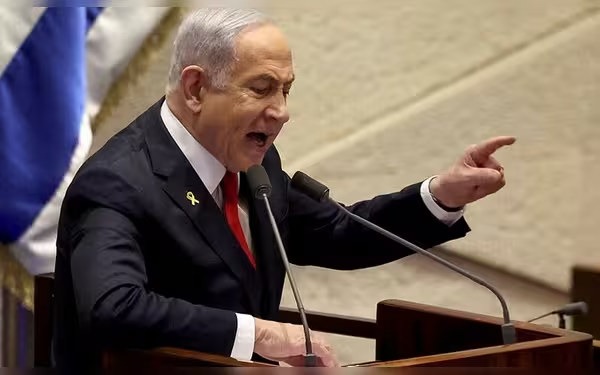Sunday, December 22, 2024 02:59 PM
Israel Targets Key Component of Iran's Nuclear Program
- Israel strikes crucial part of Iran's nuclear program.
- Netanyahu claims significant damage to Iran's missile capabilities.
- Ongoing tensions escalate following missile exchanges.
 Image Credits: dawn
Image Credits: dawnIsraeli PM Netanyahu claims airstrikes hit a key component of Iran's nuclear program, escalating military tensions in the region.
In recent developments, Israeli Prime Minister Benjamin Netanyahu has made significant claims regarding Israel's military actions against Iran. Last month, Israel conducted airstrikes targeting what Netanyahu described as a crucial component of Iran's nuclear program. This revelation has raised eyebrows and sparked discussions about the ongoing tensions between the two nations.
During a speech in the Israeli parliament, Netanyahu stated, "It’s not a secret. There is a specific component in their (Iran’s) nuclear programme that was hit in this attack." While he did not disclose the exact nature of the component, he emphasized that the airstrikes also aimed to weaken Iran's defense and missile production capabilities. This assertion comes in the wake of escalating military exchanges between Israel and Iran, particularly after Iran launched approximately 200 ballistic missiles towards Israel.
On October 26, Israeli fighter jets executed three waves of attacks on Iranian military targets. This operation followed a previous exchange of direct attacks in April, where Israel targeted one of four Russian-supplied S-300 surface-to-air missile defense batteries around Tehran. Netanyahu claimed that the recent strikes successfully destroyed the remaining three batteries, inflicting significant damage on Iran's ballistic missile production capabilities and its ability to produce solid fuel for long-range missiles.
The implications of these military actions are profound. Netanyahu's statements suggest that while Israel has made strides in disrupting Iran's nuclear ambitions, the path to a nuclear weapon for Iran remains open. This ongoing conflict highlights the delicate balance of power in the region and raises questions about the future of international relations involving Iran, Israel, and other global powers.
As the situation continues to evolve, it is crucial for observers to stay informed about the developments in this complex geopolitical landscape. The actions taken by Israel not only impact its national security but also have broader implications for regional stability and international diplomacy. Understanding these dynamics is essential for grasping the challenges that lie ahead in the quest for peace and security in the Middle East.













